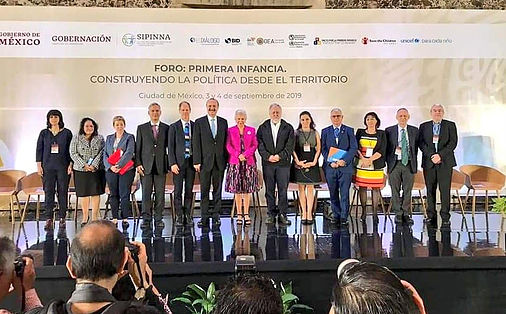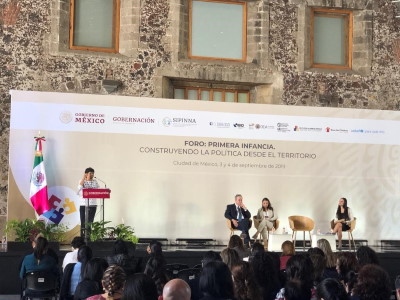
The Mexican government has published Implementation guidelines to guide implementation of the new National Strategy for Integrated Early Childhood Development (ENAPI). Both the strategy and guidelines are aligned with the Nurturing Care Framework for Early Childhood Development.
On September 3 and 4, the Sistema Nacional de Protección de Derechos de Niñas, Niños y Adolescentes (SIPINNA, National System for the Protection of the Rights of Children and Adolescents) convened an international forum in Mexico City called Construyendo la política desde el territorio (Building the policy from the territory).
This meeting is part of Mexico’s ongoing efforts to develop a multi sectoral National Early Childhood Development Strategy (Estrategia Nacional de Atención a la Primera Infancia (ENAPI)) aligned with the Nurturing Care Framework. By law, the strategy needs to be submitted to the Federal Government by November 11, 2019. In May 2019, the country made a change in their constitution. The reform explicitly mandates initial education for all children aged 0 to 3 years, in addition to the already existing pre-K, primary and secondary education.
The over 200 participants included government delegates from across the country (national, state, municipal), civil society organizations development partners (Bernard van Leer Foundation, UNICEF LACRO, Save the children, InterAmerican Dialogue, OAS), and representatives from Argentina, Chile, Colombia, Jamaica, and Uruguay.
The convening included:
- Presentations showing how State level initiatives are ensuring that ENAPI takes into account coordination of federal-state-municipal activities.
- Sharing of experiences and lessons learned regarding the governance, multisectoral coordination, and financing of multisectoral national early childhood development programs in Jamaica, Chile, Colombia and Uruguay.
- An emphasis on implementation science approaches to guide the design, implementation, and cost estimates of ENAPI taking both coverage and quality of services into account.
- A session specifically focused on nurturing care: from theory to practice
- Reflections on how the Nurturing Care Framework for Early Childhood Development has informed the design or refinement of multisectoral programs (e.g. Chile is currently strengthening their parenting strategies)
Media coverage (in Spanish):
Authorities and representatives of institutions supporting the forum shown in the picture at top of this page:
- Esteban Barragan, Secretary of Public Education, Mexico
- Alejandro Encinas Rodriguez, Sub secretary of human rights, population and migration, Mexico
- Miriam Veras Godoy, General Director of CENSIA (National Centre of children’s and adolescents’ health ), Ministry of Health, Mexico
- Christian Skoog, UNICEF Mexico representative
- Maria Caridad Araujo, Division of social protection and health, IDB, Washington DC, US
- Cristina Morales, PAHO /WHO Mexico Representative
- Ariel Fiszbein, Director of the Education program of the Inter-American Dialogue, Washington DC, US
- Luis Albernaz, OAE, IIN (Inter-American institute of children and adolescents), Washington DC, US
- Maria Menendez, Director of Save the children, Mexico
- Guadalupe Landeros garcia, Director of the Wellfare Secretary, Mexico
- Ricardo Bucio Mujica, Executive secretary of SIPINNA (National system for the integral protection of children and adolescents), Mexico
- Olga Sanchez Cordero, Secretary of Governance.

Panelists:
• Maria Elena Ubeda, Early childhood development specialist, UNICEF LACRO, Panama
• Rafael Perez-Escamilla, professor of public health, department of social & behavioral sciences, University of Yale school of public health, US
• Betzabe Butron Riveros, PAHO/WHO Regional Child Health advisor, Washington DC, US
• Moderator: Jimena Lazcano Norori, Early Childhood development officer, UNICEF Mexico





